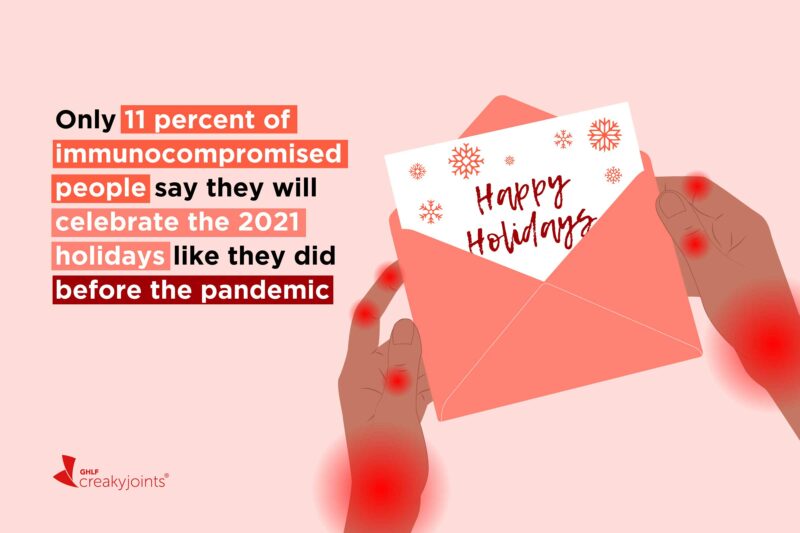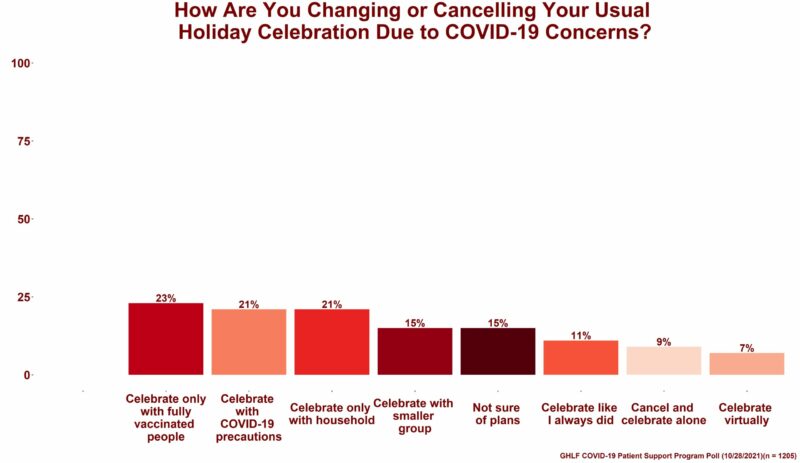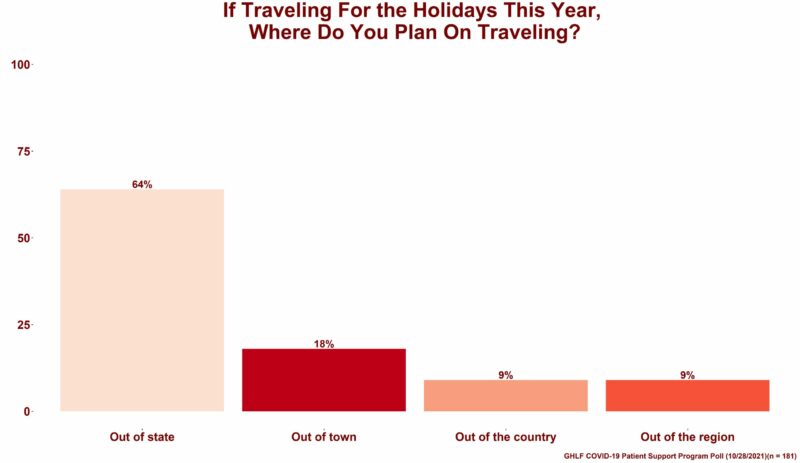Learn more about our FREE COVID-19 Patient Support Program for chronic illness patients and their loved ones.
Even if you missed Mariah Carey’s “smashing” announcement, it’s hard to ignore the fact that the holiday season has begun in the United States. This is normally the time of year where people start finalizing (or, figuring out, in the care of procrastinators) their plans for the season. But thanks to the ongoing COVID-19 pandemic, this time of year is anything but normal. Families and friends are trying to figure out how to continue the holiday traditions they love without putting their health at risk.
Although the availability of the COVID-19 vaccine (especially third doses and boosters) should make holiday planning a little easier this year than last, people are still struggling to decide what is and isn’t okay to do. In October, the U.S. Centers for Disease Control and Prevention (CDC), released updated suggestions for safely celebrating the holidays. The suggestions, which are not as restrictive as they were last year, include:
- Protect those not yet eligible for vaccination by getting yourself and other eligible people around them vaccinated.
- Wear well-fitting masks over your nose and mouth if you are in public indoor settings if you are not fully vaccinated.
- If you are sick or have symptoms, don’t host or attend a gathering.
These make sense for generally healthy people. But, as with much of the guidance that has been issued during the pandemic, the recommendations come with a caveat for immunocompromised people.
“People who have a condition or are taking medications that weaken their immune system may not be fully protected even if they are fully vaccinated and have received an additional dose,” says the CDC. “They should continue to take all precautions recommended for unvaccinated people, including wearing a well-fitted mask, until advised otherwise by their health care provider.”
In our latest poll, the Global Healthy Living Foundation’s COVID-19 Patient Support Program aimed to gain more insight into how its immunocompromised and high-risk community members plan to spend the upcoming holiday season.
Of the 1,227 survey respondents (98 percent report being fully vaccinated), only 11 percent plan to celebrate the holidays like they did before the pandemic. Others will be taking at least one type of precaution, whether that means rescheduling the celebrations to allow for COVID-19 testing, changing the location to eliminate travel, or limiting who they see throughout the season.
Here are some other key learnings and insights from the poll.
Many immunocompromised people will be altering their guest lists for the 2021 holidays.
The poll asked whether and how people would change their usual holiday celebrations due to COVID-19 concerns. They were given eight options to choose from, and able to select all options that applied to their holiday plans.
- 23% will celebrate in person, but only with others who are fully vaccinated
- 21% will celebrate in person with family and/or friends but take COVID-19 precautions
- 21% will celebrate with their household (no outside family or friends)
- 15% will celebrate in person with a smaller group than usual
- 15% are not sure of their plans yet
- 11% will celebrate like they did before the pandemic
- 9% will cancel usual holiday plan(s) and celebrate alone
- 7% will celebrate virtually with family and/or friends
Between the availability of the initial vaccine series, third vaccine doses for immunocompromised people, and booster vaccines for high-risk individuals, many CreakyJoints community members feel more protected against COVID-19 than they did this time last year.
Taking Precautions
“All family members have been fully vaccinated, so I feel comfortable to be with them,” one person wrote in the open response section of the survey.
Another shared similar sentiments, writing “everyone in my family and my closest friends are all fully vaccinated so I feel very much at ease.”
But even with the extra protection from the COVID-19 vaccine, several members of the community will continue to proceed with caution. For some, this means gathering with fewer people, celebrating outdoors if the weather permits, and wearing masks when socializing indoors. For others, this means getting tested for COVID-19 before gathering with loved ones.
“We will have some friends staying in nearby rentals [and] I am asking them to take a COVID-19 test when they arrive,” one person wrote.
“Everyone attending, except two small grandchildren are fully vaccinated. But we will still have everyone get tested within 72 hours of the family dinner,” another person shared.
Similarly, one person wrote, “my small family will be coming off an airplane the day before Thanksgiving and we will celebrate on Sunday after everyone has taken a COVID test and is negative. I’m too old to miss a possible last holiday with my family.”
Celebrating Alone
For some, however, proceeding with caution means celebrating the holidays alone.
“Although I’m fully vaccinated, underlying conditions may still result in COVID-19 complications for me and it’s not worth the risk,” said one respondent. “I’ll be alone again, but that’s fine.”
“I’m sad to spend another holiday season with restraint but it seems irresponsible to gather in a larger group if unvaccinated persons are involved and with cases slightly up in our immediate area,” another said.
“Because I take two highly immunosuppressive medications, my doctors have advised me to continue limiting indoor contact with even vaccinated family & friends,” one patient shared. “With people traveling for the holidays and multiple households combining, it’s not feasible for us to safely be with family this year so my husband and I will celebrate by taking a trip to a cabin instead. I’m happy we have some plans, but we are sad and disappointed to miss out on holidays with our families yet again, and to still not know how much protection I have from my vaccine.”
Most immunocompromised people are not traveling for the 2021 holidays.
Survey participants were also asked if they would be traveling for the upcoming holidays and an overwhelming majority (85 percent) said they would not be traveling. Of those who do plan on traveling:
- 64% will be traveling out of state
- 18% will be traveling out of town
- 9% will be traveling out of the country
- 9% will be traveling out of the region
When it comes to how they will travel this holiday season, many community members are opting for cars instead of public transportation.
“We feel okay to drive out of state but do not feel comfortable flying,” one person wrote.
Similarly, another said, “I still don’t feel safe flying so can I only spend the holidays with family within driving distance.”
And those who are taking to the skies aren’t completely comfortable with the decision.
“I am a little worried about the airline travel,” one person shared. “On recent flights, other passengers are very lax about the placement and wearing of their masks, like wearing them below the nose and not putting them back on after drinking and eating.”
Some people mentioned the need to be flexible with travel plans. As one person said, “if I hear some member of my family has covid I will cancel my travel plans.”
Several immunocompromised people are waiting on more information before making holiday plans.
Numbers of new COVID-19 cases remain in flux. Though they have been declining in much of the U.S. since August, there are still a lot of unknowns as the holiday season approaches. It’s no wonder that many poll respondents said they are still unsure about their plans.
“Most of my family is okay with gathering, but I don’t know what I should do to stay safe,” one person wrote.
“I’m unsure what will be low risk for me,” another person wrote. “My family members are fully vaccinated and will test before gathering, but I’m still apprehensive about gathering inside with anyone at this point.”
Our poll results show that many immunocompromised and high-risk individuals are making difficult decisions to prioritize their health over how they spend the holidays this season.
“Unfortunately, I wasn’t blessed with good health and people like me need healthy people to help protect high risk individuals,” one patient wrote. “I miss my family and friends and want to be able to get out of my house bubble but can’t. My hope for the holidays is more people will do their part so we can all live life again.”
The Global Healthy Living Foundation is committed to providing ongoing education about COVID-19 vaccines for the chronic illness and immunocompromised community.
To stay informed about the latest COVID-19 vaccine news for people who are immunocompromised, take immunosuppressant medications, or have autoimmune conditions, follow all of our COVID-19 vaccine coverage here.
Get Free Coronavirus Support for Chronic Illness Patients
Join the Global Healthy Living Foundation’s free COVID-19 Support Program for chronic illness patients and their families. We will be providing updated information, community support, and other resources tailored specifically to your health and safety.
About the Patient Support Program Quick Poll
Members of our program have underlying health issues — such as inflammatory arthritis and other autoimmune conditions, heart disease, lung disease, diabetes, and more — that may increase their risk for COVID-19 complications. They are interested in understanding the best ways to stay safe during the pandemic and to be part of a community of people with similar concerns, questions, and fears.
We regularly poll members, who live in the U.S. as well as around the globe, about a variety of topics, including how the pandemic is affecting their lifestyle, mental health, chronic disease management, medication adherence, and more.
We use this information to inform the educational resources we provide and to inform other stakeholders — such as public health experts, policymakers, advocacy groups, health care professionals, and pharmaceutical companies — about chronic illness patients’ needs and concerns. You can participate in ongoing polls by joining the support program here.
CDC COVID Data Tracker. Trends in Number of COVID-19 Cases and Deaths in the US Reported to CDC, by State/Territory. U.S. Centers for Disease Control and Prevention. https://covid.cdc.gov/covid-data-tracker/#trends_dailycases.
COVID-19 Holiday Celebrations. U.S. Centers for Disease Control and Prevention. October 15, 2021. https://www.cdc.gov/coronavirus/2019-ncov/daily-life-coping/holidays/celebrations.html.








